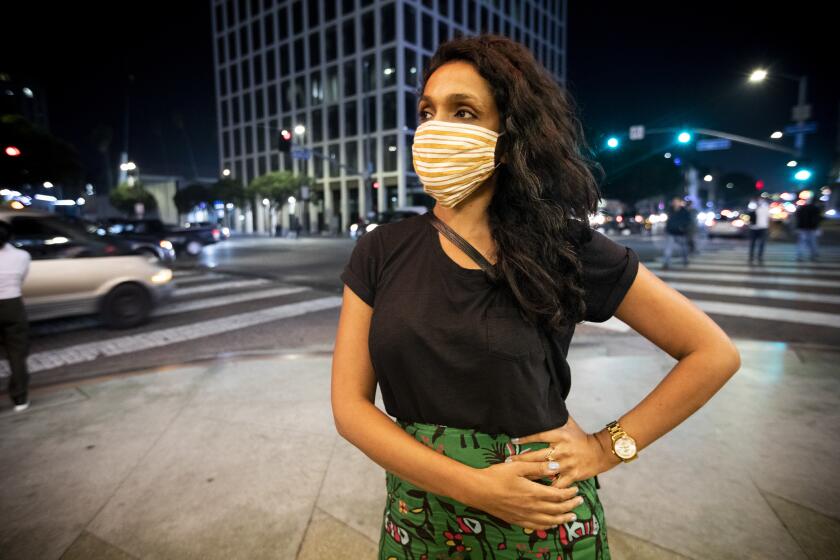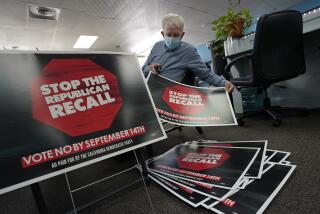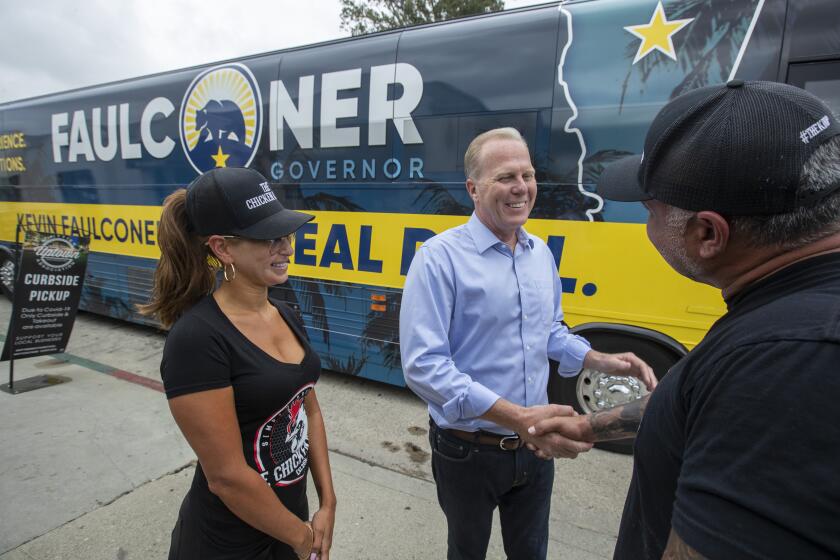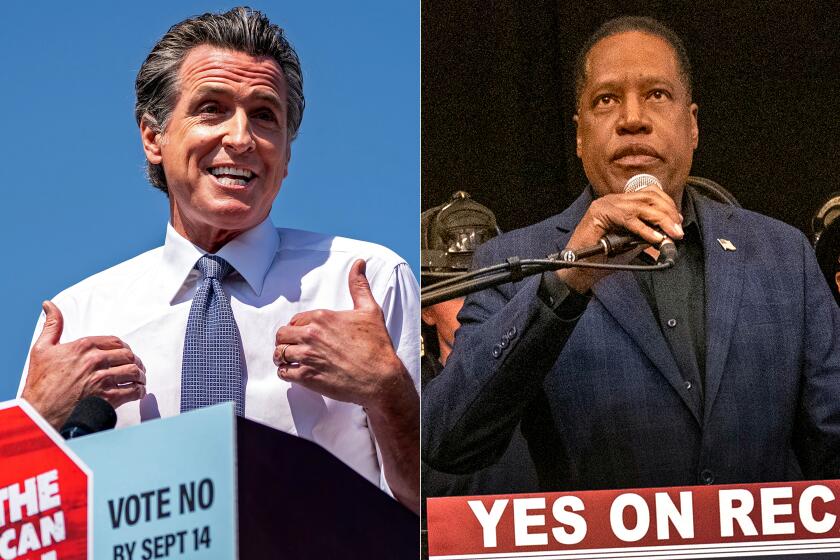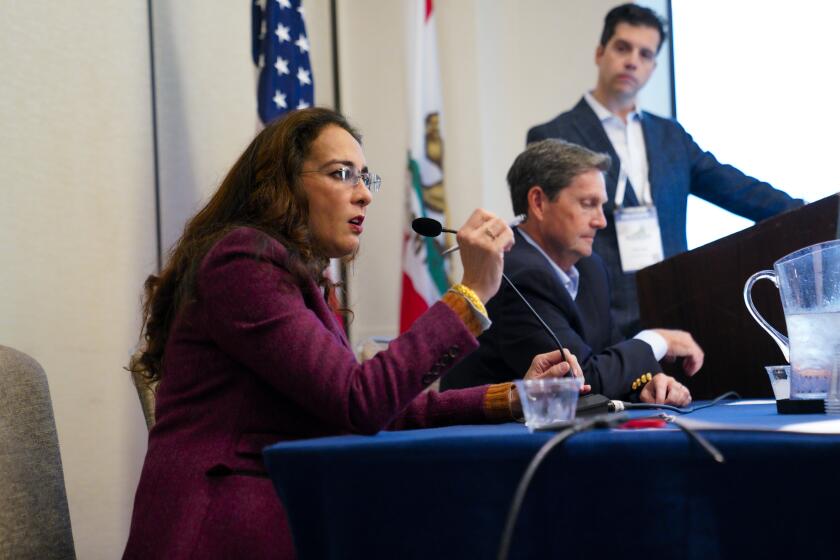Recall fever strikes California as angry voters take on politicians in large numbers
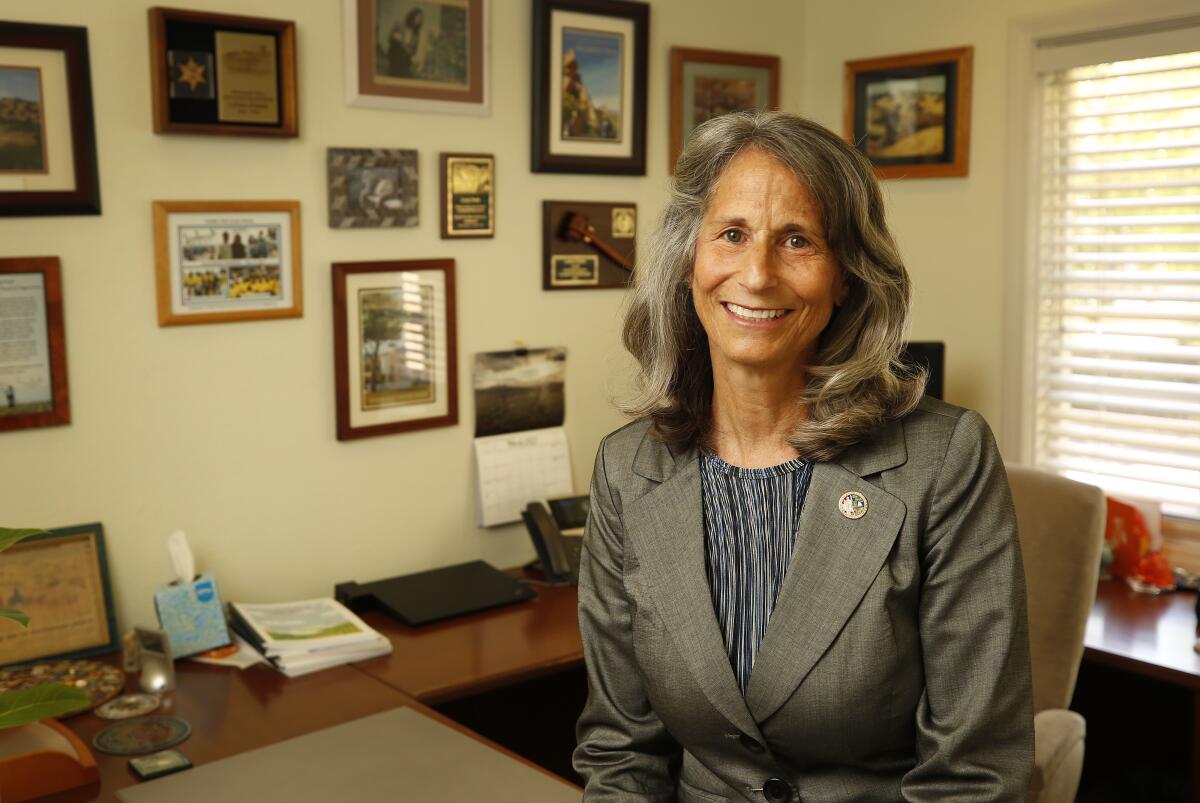
- Share via
After nearly 20 years on the Ventura County Board of Supervisors, Linda Parks thought her last political campaign was behind her. But Parks, a Republican-turned-political-independent who will be termed out of office at the end of next year, has once again found herself suiting up for political battle.
In late February, opponents officially launched a campaign to recall the five-term supervisor from office amid a maelstrom of mudslinging.
Seething rage over coronavirus closures — and Ventura County’s decision to pursue litigation against a number of businesses that repeatedly violated closure orders — are driving the recall effort.
“I’ve never seen a worse time for being a local elected official,” Parks said, describing a level of vitriol unlike anything she has previously encountered. “I feel sorry for the school boards. I feel sorry for my fellow supervisors. I feel sorry for my city council members.”
For months, attention has focused on the high-profile campaign to remove Gov. Gavin Newsom from office. But he is far from the only California politician fending off a people’s revolt. Local recall attempts have flared across nearly every corner of the state in recent months, from rural Northern California to the southern border.
An analysis projects the recall election against Gov. Gavin Newsom will cost $215 million, an amount that’s likely to grow as more candidates emerge.
Consider the recall as a kind of direct-democracy emergency exit button. For more than a century, every California voter has had the right to try and push it, but very few ever do. Even fewer do so successfully.
During the first five months of 2021, active recall efforts — those in which an official step has been taken — have targeted at least 68 local officials in California, according to a Times analysis. The total has already surpassed the number of local recall attempts seen during four of the last five years in California, according to Ballotpedia, a nonpartisan website that tracks American politics and elections.
Santa Clara County typically deals with one or two recall attempts in a year. So far this year, eight local officials — all school board members — have been targeted.
Paperwork for five recall attempts has been filed this year in San Francisco — the same number filed there during the previous 15 years. The two dueling campaigns to recall Dist. Atty. Chesa Boudin and campaigns to recall three members of the San Francisco school board have all drawn a slew of publicity.
In the tiny industrial city of Vernon, south of downtown Los Angeles, two City Council members were ousted earlier this month during the city’s first recall election in modern memory. Come September, Vernon’s 120 registered voters will decide the fate of two more council members in a second recall election on Sept. 14.
That very day, Sonoma County voters will decide whether to recall their district attorney.
The newest formal bid moved forward Wednesday, when L.A. City Councilwoman Nithya Raman was served with a recall notice outside her Silver Lake home. (A campaign to recall L.A. Councilman Mike Bonin, not to be confused with the 2017 campaign to recall him, has yet to file official paperwork.)
Local election officials and experts have cited publicity around the Newsom recall, as well as pandemic fallout and an increasingly combative national political atmosphere, as likely factors driving this year’s frenzy of local recalls.
“This is another way for the public to say, ‘We’re watching you, and we’re going to hold you accountable,’” said Sacramento County elections chief Courtney Bailey-Kanelos.
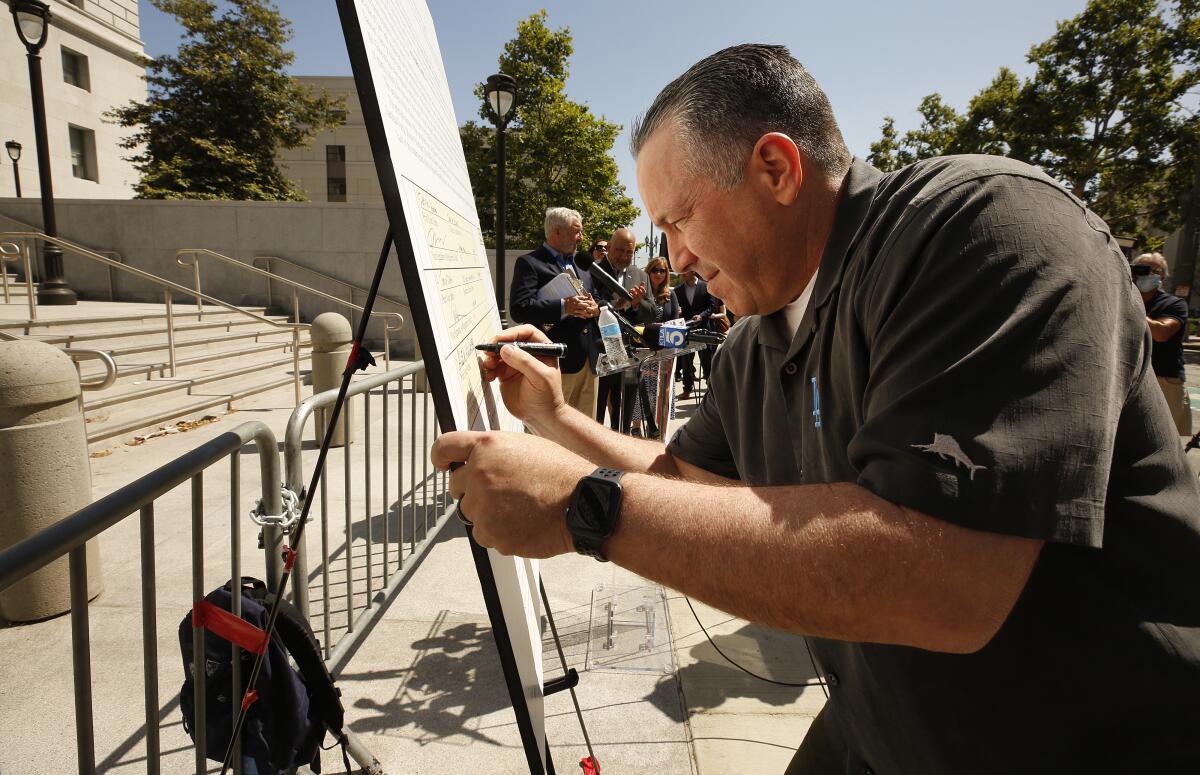
Bailey-Kanelos’ office now fields roughly three times more recall inquiries than it has in the past.
The stream of calls and emails began pouring into her office in the weeks after the November election — during the same month that a now-infamous dinner at the French Laundry rocketed a long-shot campaign to recall the governor to the forefront of state politics.
The increase in recall attempts targeting local school board members has been “unprecedented,” said California School Boards Assn. spokesperson Troy Flint. School board members account for two-thirds of the local officials targeted for recall this year, with many campaigns targeting multiple members of the same board.
It’s too soon to say whether the upswing in filed recall attempts will actually lead to more special elections later this year. More than a few of those 68 attempts have already fizzled. Several stalled out of the gate with filings that didn’t meet election code standards, while others failed to gather enough signatures during the requisite timeline.
Local recall proponents have between 40 and 160 days to gather petition signatures, depending on the number of voters in a district. (Recall petitions must be signed in person.) That strict timeline is one of the biggest hurdles to successfully qualifying a recall attempt, and a pandemic-related extension in signature-gathering time is widely believed to have made the Newsom recall possible.
Recalls have been generally on the rise nationally since the 1980s, according to Joshua Spivak, a senior fellow at the Hugh L. Carey Institute for Government Reform at Wagner College and one of the nation’s leading experts on recalls. Amid that broader tide, Spivak said the 2003 recall of California Gov. Gray Davis helped solidify the recall’s place in the public consciousness.
“It’s permeated people’s minds that you could do this,” Spivak said, citing ensuing pop culture references such as a 2005 episode of “The Simpsons” and a 2013 episode of “Parks and Recreation” that focused on recall elections. “So once you know you could do it, why not do it?”
The COVID-19 pandemic was listed as a factor in more than half of the recalls Ballotpedia tracked this year, the vast majority of which stemmed from anger over COVID-related closures or restrictions.
“People were sitting at home and feeling impotent,” said longtime Thousand Oaks resident and retired high school receptionist Karen Meyer. Meyer now often spends weekends at a small folding table in the parking lot of a local Target or DMV, asking passersby if they’d like to sign petitions to recall Parks in Ventura County.
The recall organizer faulted her county supervisor for hewing too closely to Newsom’s pandemic directives and not doing enough to save local businesses, such as a now-shuttered Thousand Oaks doughnut shop that would customize special flavors for Meyer’s husband after a 2019 brain surgery diminished his sense of taste.
Recall backers say Raman’s office is inexperienced, unresponsive and too politically radical. The councilwoman responded that she’s focusing on a “broad progressive agenda.”
People felt like they had no control over what was happening during the pandemic, Meyer said, with choices being made that they hadn’t voted for and didn’t approve.
But Parks said she believes that she enforced necessary restrictions during a time of crisis. “If I’m being recalled for doing all I can to keep people from getting COVID and dying, so be it,” she said. “I don’t regret that at all.”
As recall attempts proliferate amid an increasingly agitated political atmosphere, several experts and election officials said they were concerned about the potential strain on already overworked, understaffed local election departments.
Sonoma County elections chief Deva Marie Proto said she worries about staff burnout and the general toll on resources.
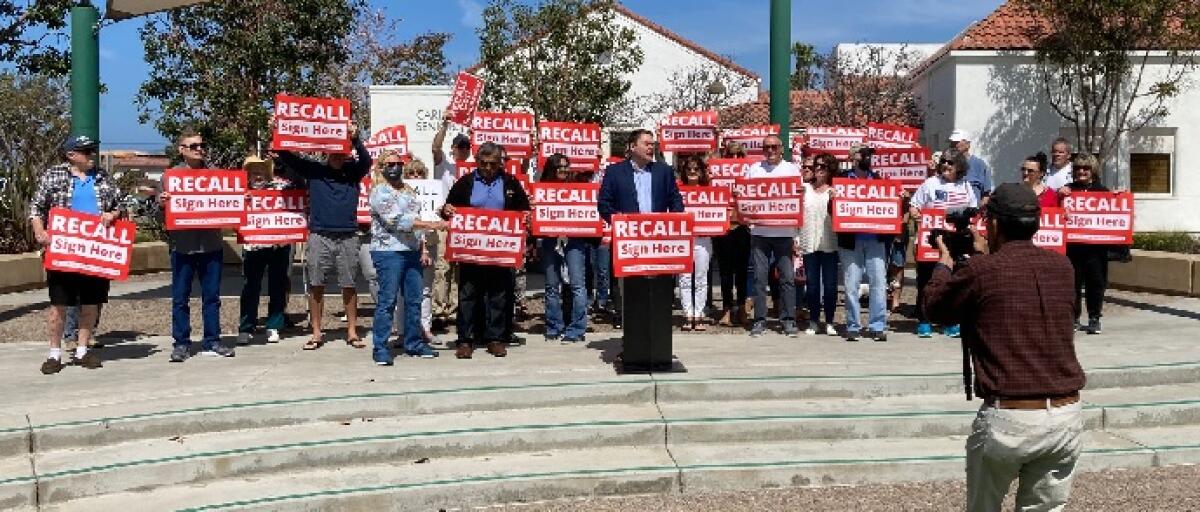
Along with a long-scheduled November district election, Sonoma County will be juggling the yet-to-be-scheduled Newsom recall and a Sept. 14 special election to recall Sonoma County Dist. Atty. Jill Ravitch, an effort that qualified for the ballot in May.
That recall was bankrolled by a wealthy developer whose company was investigated by Ravitch and the state attorney general’s office for allegedly leaving elder care home residents with no means to evacuate during a 2017 wildfire, resulting in a $500,000 settlement and five-year injunction.
The special election, which will come less than a year before a regularly scheduled election that Ravitch does not plan to run in, will cost the county approximately $600,000 to $900,000.
All of this comes on the heels of 2020, which Proto described as “an absolutely extraordinary year” in terms of the extra work and stress placed on local election offices. “And it’s not slowing down,” she said.
Echoing the words of several other organizers, San Francisco school board recall co-chair Siva Raj described recall politics as something he and his partner, Autumn Looijen, never thought would enter their lives. But both said they felt they’d exhausted every other option and still had not been heard.
“They were completely unwilling to listen to parents,” Raj said. “So we said, ‘Maybe we’ll have to do something a bit more drastic to get them to listen to us.’”
More to Read
Sign up for Essential California
The most important California stories and recommendations in your inbox every morning.
You may occasionally receive promotional content from the Los Angeles Times.

